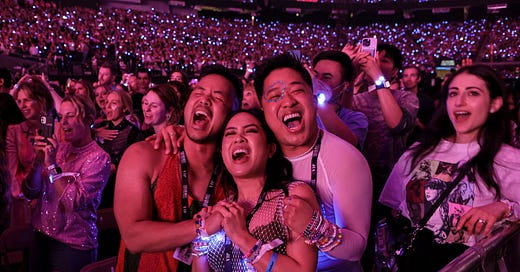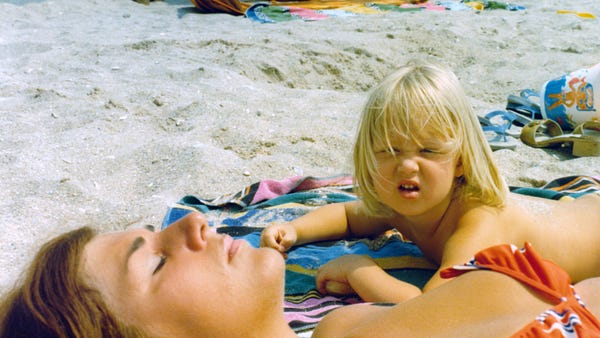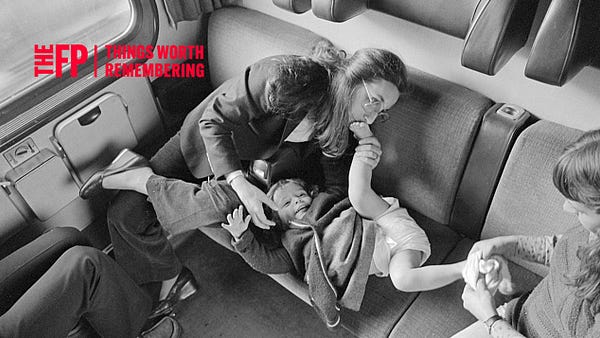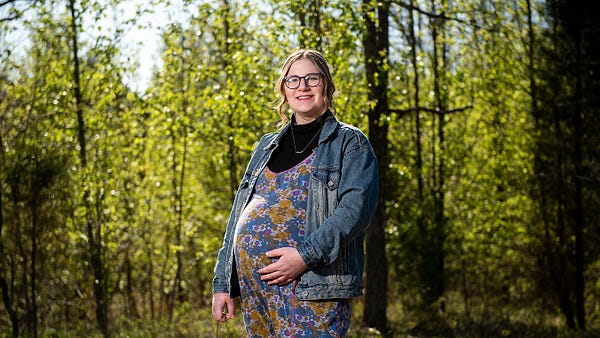
The Free Press

I should probably start by telling you that Taylor Swift got me into Brown University, so I’m not exactly an unbiased narrator.
When I say she got me in, it’s not an overstatement. Yes, my transcript was fine. My SATs, solid. But I am fully convinced that in a sea of essays about volunteer trips to South America and founding nonprofits and what the Common App refers to as the “background” and “challenge” essays, the fact that I wrote about the biggest pop star in the world and declared to perfect strangers that I “chant” “Shake It Off with Taylor Swift” made me stand out.
I have been a Swiftie since I was 11 years old, when I had two tickets to the 1989 tour in my cart but was too ashamed to proceed to checkout. The first song I sang nightly into my mirror was “You Belong with Me.” From there, it was a rabbit hole of “Fearless,” “Love Story,” “Hey Stephen,” and a daily routine of switching my music from refrains like Marry me Juliet to Lil Wayne’s She lick me like a lollipop every time I left the house.
It turns out some 53 percent of American adults feel the same way. I met 70,000 of them at the Eras tour. Because I am crazy, I went twice in a row: first with my 13-year-old sister, and next with my girlfriend, her 23-year-old brother, and her parents.
This week, Swift finished the United States leg of a tour that’s making her a billionaire: 146 shows, five continents, and who knows how many pounds of glitter. Some estimate the tour will gross $1.4 billion in less than half the time it took Elton John’s last tour—the highest grossing tour ever—to earn its $940 million. Tickets for Swift’s most recent show at SoFi Stadium in Los Angeles went for $853 minimum. The six nights she performed there brought in $160 million.
She’s worth every penny.
Swift boosted the nation’s economy—the Philadelphia Federal Reserve credited the highest month of hotel revenue in the post-Covid era to “an influx of guests for the Taylor Swift concerts in the city”—and her L.A. stint boosted the county’s GDP by $320 million. Other world leaders have noticed: Justin Trudeau took to Twitter to plead for Canadian dates. Her tour has also been literally earth-shaking: in Seattle, the tour produced the “Swift Quake,” an earthquake of 2.3 magnitude. The emotional gravity of the show is so intense that the BBC, Time magazine, and NPR have all reported Swifties experiencing Eras amnesia. While we’ve all heard the cliché “out-of-body experience,” that is literally what is happening in stadiums across the country: an associate professor of psychology at SUNY Albany explained the neurological response to Swift as essentially equivalent to staving off a bear attack.

It’s not just the cult of Tumblr stans, either. Channing Tatum and Aaron Rodgers were both caught on camera shaking it off. Girl dads from Flava Flav to Mark Zuckerberg have shown up decked out in Swiftian friendship bracelets or glitter. Even the late Kobe Bryant was a Swiftie, declaring her a “certified killer.”
And if you think Taylor’s just for the rich, her biggest demographic of fans (49 percent) reports a household income under $50,000.
So what’s the deal? How is one woman holding up the economy, rumbling the earth, and erasing people’s minds?
For starters, she is a walking mitzvah: giving Alicia Keys’s son a handwritten note, hugging Kobe’s daughter mid-song, and, most of all, giving $100,000 bonuses to the Eras tour’s crew—which cost her $55 million—with a handwritten note and her monogrammed wax seal.
Then there’s the community. At a Taylor Swift show, the rituals include the “You Belong with Me” double clap, the “Shake It Off” triple clap, the lyric-inscribed friendship bracelet exchange. Fans make bracelets out of colorful beads that spell out Swift song titles, quotes, and inside jokes and trade them everywhere from the chicken tenders stand during openers to the New Jersey transit ride back home. One hand signals those available for barter, while the other hand is reserved for the treasured, off-limits keepsakes. Or there’s my personal favorite tradition: the surprise songs. Each night, Swift will play two songs unaccompanied and purely acoustic that aren’t on the setlist.
Some may hear this and dial the American cult hotline. Others, like David Brooks, might think: this is exactly what we need (see “There Should Be More Rituals!”). While I don’t know every kind of clap, I do know the smile on my sister’s face after a girl wearing Eras merch handed her a bracelet in the bathroom of an arts and crafts store.

And we all grew up with her. In the span of “All Too Well,” she followed me from being “a little kid with glasses in a twin-sized bed” who spent his Saturdays “on the tee-ball team,” to “turning 21.” I listened to her sing about “when you’re fifteen and your first kiss makes your head spin around” at fifteen, after my first kiss. And while I did not sit in class next to a girl named Abigail (as she sings in “Fifteen”), there are about 41,581 Americans who either already have or one day will.
Then there’s the music. If you are one of those people who thinks it’s all sweeping clichés and empty drum machines, take a seat and listen to “Back to December.” Or “All Too Well,” the 10-minute story that spills out of a single forgotten scarf. Or try “The Last Great American Dynasty,” her brief foray into long-form journalism.
So when she comes onstage in a football stadium filled with 70,000 gaylors, Hall of Fame quarterbacks, and little girls younger than Red, it is no surprise that emotions (and tectonic plates) run wild as the most private parts of our lives become the most public spectacle of the decade.
This is the essence of Swift’s stardom: she flawlessly straddles the line between the accessible and the divine. While her shows are so in demand that they shut down Ticketmaster, if you do end up there, there is always a chance she will pluck you from the crowd for her post-show meet and greets, bake you cookies in her home, or even do a surprise performance at your wedding—proving once and for all that her love stories really can become yours, too.
We are living in a culture hungry for movie stars because we hunger for common experiences. New York Times critic Wesley Morris declared in 2022 that “We’re Out of Movie Stars,” and the SAG-AFTRA strike took out the few we have left. The awe with which we used to regard the Audrey Hepburns and Marilyn Monroes of the world has been chopped up into fifteen-second TikTok clips where we snack on a never-ending supply of forgettable influencers.
This is the hunger Swift feeds with her bubblegum pinks and cotton candy blues: finally, all 340,000,000 of us are looking in the same direction—whether it’s at the stage or her girlboss brat pack of Gigi Hadid, Selena Gomez, and Karlie Kloss. Taylor is neither your progressive savior nor your tortured post-feminist artist. She is, however, your long-awaited true pop star.

While legends like Madonna and Beyoncé used to rival Swift, her Eras tour is leaving them in the dust: the very first night in Glendale, Arizona, broke Madonna’s 36-year record for most attended female concert in American history. On May 26, the day I went, the most expensive StubHub ticket for Beyoncé (in France, no less) was $4,722 compared to Swift’s $92,149. Madonna may wave an AK-47 onstage and Beyoncé may film a music video at the Louvre, but Taylor needs neither a weapon nor an art history major to convince you of her greatness. Instead, she writes songs that sound like pages ripped from her diary—and most of the time, it sounds like they could have been ripped from yours, too. As she tells us in the title of her documentary: Taylor Swift is Miss Americana, hero of the masses.
For us Swifties, though, it will always be deeper than that. As Taylor Swift moves back through her Eras in earthquakes, economy boosts, and flurries of glitter, she seems to whisper in the midst of all the pageantry the words she once sang full-throatedly 13 years ago: may these memories break our fall. Each era is a reminder that, even in our national epidemic of loneliness, there is one woman who’s been there for us all along.
Evan Gardner (@EvanGardne9) is a summer intern at The Free Press.
If you appreciate our pop culture coverage, become a subscriber today:
We’re hosting our first live debate on September 13 at the Ace Theatre in Los Angeles! Has the sexual revolution failed? Come argue about it and have a drink. We can’t wait to meet you in person. You can purchase tickets now at thefp.com/debates.
















For all the “haters gonna hate hate hate hate” with the Time mag accolade it’s clear T Swift is significant -- even if the evidence of her impact on the economy wasn’t enough of a reason for a piece a few month ago.
If you need more of a justification, check out some of the alt right (Loomer for eg) who believe TS is part of a larger plot to steal the upcoming election from Trump once again.
Or, her cover photos on the Time magazine that got some of the Trad men foaming at the mouth for TS being, gasp, held up as an example since she is a “promiscuous, single, old woman that lives with a cat.” Seriously it made me cackle out loud. And I’m married to a man with child FYI.
Anyway, she will just shake it off because she’s a mastermind. ❤️
Evan Gardner is one heck of a writer.